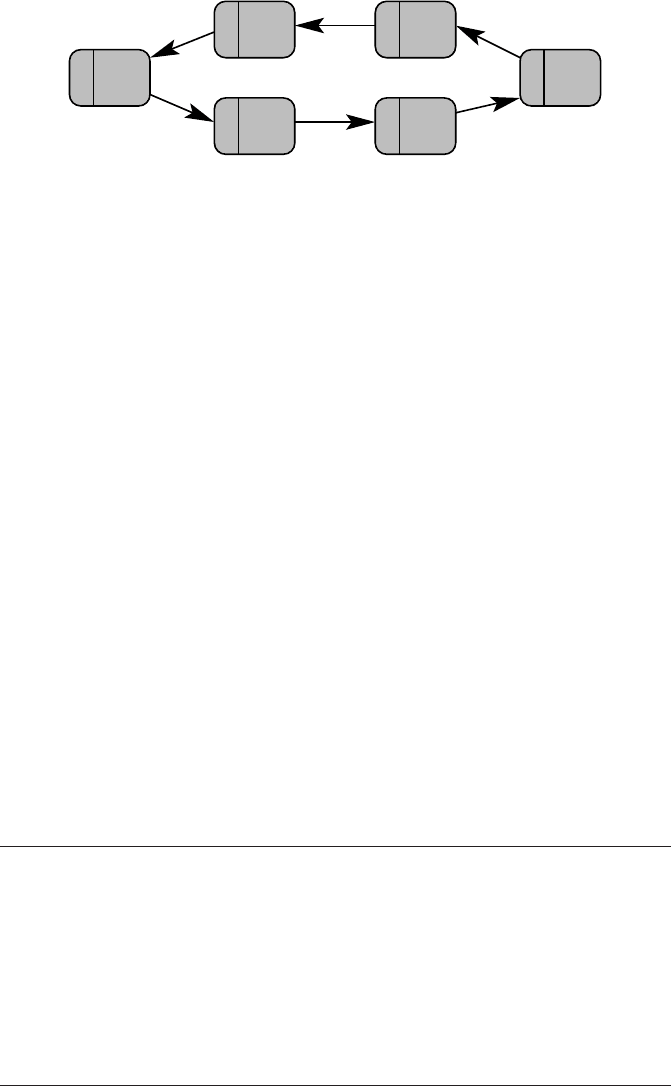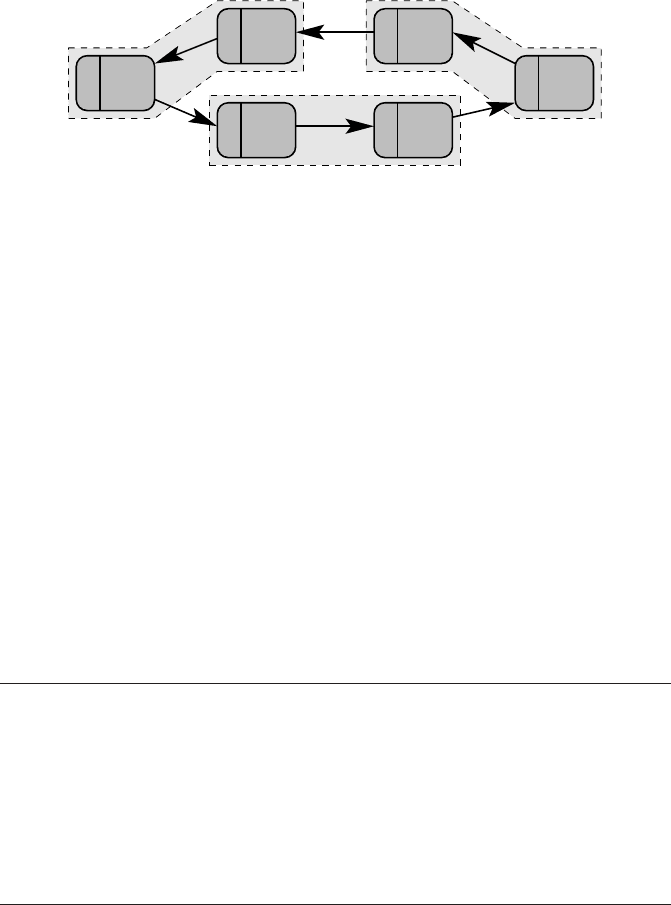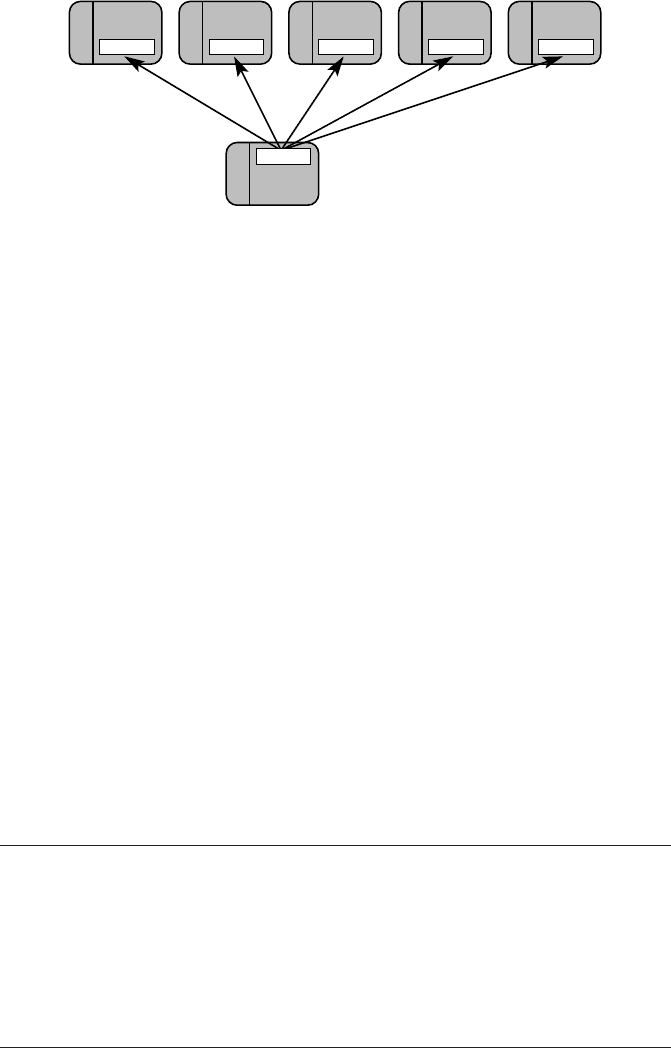Hager G., Wellein G. Introduction to High Performance Computing for Scientists and Engineers
Подождите немного. Документ загружается.


Distributed-memory parallel programming with MPI 205
Listing 9.1: A very simple, fully functional “Hello World” MPI program in Fortran 90.
1 program mpitest
2
3 use MPI
4
5 integer :: rank, size, ierror
6
7 call MPI_Init(ierror)
8 call MPI_Comm_size(MPI_COMM_WORLD, size, ierror)
9 call MPI_Comm_rank(MPI_COMM_WORLD, rank, ierror)
10
11 write(
*
,
*
) ’Hello World, I am ’,rank,’ of ’,size
12
13 call MPI_Finalize(ierror)
14 end
9.2 A short introduction to MPI
9.2.1 A simple example
MPI is alwaysavailable as a library. In order to compile and link an MPI program,
compilers and linkers need options that specify where include files (i.e., C headers
and Fortran modules) and libraries can be found. As there is considerable variation
in those locations among installations, most MPI implementations provide compiler
wrapper scripts (often called mpicc, mpif77, etc.), which supply the required op-
tions automatically but otherwise behave like “normal” compilers. Note that the way
that MPI programs should be compiled and started is not fixed by the standard, so
please consult the system documentation by all means.
Listing 9.1 shows a simple “Hello World”-type MPI program in Fortran 90. (See
Listing 9.2 for a C version. We will mostly stick to the Fortran MPI bindings, and
only describe the differences to C where appropriate. Although there are C++ bind-
ings defined by the standard, they are of limited usefulness and will thus not be
covered here. In fact, they are deprecated as of MPI 2.2.) In line 3, the MPI mod-
ule is loaded, which provides required globals and definitions (the preprocessor is
used to read in the mpi.h header in C; there is an equivalent header file for Fortran
77 called mpif.h). All Fortran MPI calls take an INTENT(OUT) argument, here
called ierror, which transports information about the success of the MPI operation
to the user code, a value of MPI_SUCCESS meaning that there were no errors. In C,
the return code is used for that, and the ierror argument does not exist. Since fail-
ure resiliency is not built into the MPI standard today and checkpoint/restart features
are usually implemented by the user code anyway, the error code is rarely used at all
in practice.
The first statement, apart from variable declarations, in any MPI code should be

206 Introduction to High Performance Computing for Scientists and Engineers
Listing 9.2: A very simple, fully functional “Hello World” MPI program in C.
1 #include <stdio.h>
2 #include <mpi.h>
3
4 int main(int argc, char
**
argv) {
5 int rank, size;
6
7 MPI_Init(&argc, &argv);
8 MPI_Comm_size(MPI_COMM_WORLD, &size);
9 MPI_Comm_rank(MPI_COMM_WORLD, &rank);
10
11 printf("Hello World, I am %d of %d\n", rank, size);
12
13 MPI_Finalize();
14 return 0;
15 }
a call to MPI_Init(). This initializes the parallel environment (line 7). If thread
parallelism of any kind is used together with MPI, calling MPI_Init() is not suf-
ficient. See Section 11 for details.
The MPI bindings for the C language follow the case-sensitive name pattern
MPI_Xxxxx..., while Fortran is case-insensitive, of course. In contrast to Fortran,
the C binding for MPI_Init() takes pointers to the main() function’s arguments
so that the library can evaluate and remove any additional command line arguments
that may have been added by the MPI startup process.
Upon initialization, MPI sets up the so-called world communicator, which is
called MPI_COMM_WORLD. A communicator defines a group of MPI processes that
can be referred to by a communicator handle. The MPI_COMM_WORLD handle de-
scribes all processes that havebeen started as partof the parallel program. Ifrequired,
other communicators can be defined as subsets of MPI_COMM_WORLD. Nearly all
MPI calls require a communicator as an argument.
The calls to MPI_Comm_size() and MPI_Comm_rank() in lines 8 and 9
serve to determine the number of processes (size) in the parallel program and
the unique identifier (rank) of the calling process, respectively. Note that the C
bindings require output arguments (like rank and size above) to be specified as
pointers. The ranks in a communicator, in this case MPI_COMM_WORLD, are con-
secutive, starting from zero. In line 13, the parallel program is shut down by a call
to MPI_Finalize(). Note that no MPI process except rank 0 is guaranteed to
execute any code beyond MPI_Finalize().
In order to compile and run the source code in Listing 9.1, a “common” imple-
mentation may require the following steps:
1 $ mpif90 -O3 -o hello.exe hello.F90
2 $ mpirun -np 4 ./hello.exe
This would compile the code and start it with four processes. Be aware that pro-

Distributed-memory parallel programming with MPI 207
MPI type Fortran type
MPI_CHAR CHARACTER(1)
MPI_INTEGER INTEGER
MPI_REAL REAL
MPI_DOUBLE_PRECISION DOUBLE PRECISION
MPI_COMPLEX COMPLEX
MPI_LOGICAL LOGICAL
MPI_BYTE N/A
Table 9.1: Standard MPI data types for Fortran.
cessors may have to be allocated from some resource management (batch) system
before parallel programs can be launched. How exactly MPI processes are started
is entirely up to the implementation. Ideally, the start mechanism uses the resource
manager’s infrastructure (e.g., daemons running on all nodes) to launch processes.
The same is true for process-to-core affinity; if the MPI implementation provides no
direct facilities for affinity control, the methods described in Appendix A may be
employed.
The output of this program could look as follows:
1 Hello World, I am 3 of 4
2 Hello World, I am 0 of 4
3 Hello World, I am 2 of 4
4 Hello World, I am 1 of 4
Although the stdout and stderr streams of MPI programs are usually redirected
to the terminal where the program was started, the order in which outputs from dif-
ferent ranks will arrive there is undefined if the ordering is not enforced by other
means.
9.2.2 Messages and point-to-point communication
The “Hello World” example did not contain any real communication apart from
starting and stopping processes. An MPI message is defined as an array of elements
of a particular MPI data type. Data types can either be basic types (corresponding to
the standard types that every programming language knows) or derived types, which
must be defined by appropriate MPI calls. The reason why MPI needs to know the
data types of messages is that it supports heterogeneous environments where it may
be necessary to do on-the-fly data conversions. For any message transfer to proceed,
the data types on sender and receiver sides must match. See Tables 9.1 and 9.2 for
nonexhaustive lists of available MPI data types in Fortran and C, respectively.
If there is exactly one sender and one receiver we speak of point-to-point commu-
nication. Both ends are identified uniquely by their ranks. Each point-to-point mes-
sage can carry an additional integer label, the so-called tag, which may be used to
identify the type of a message, and which must match on both ends. It may carry

208 Introduction to High Performance Computing for Scientists and Engineers
MPI type C type
MPI_CHAR signed char
MPI_INT signed int
MPI_LONG signed long
MPI_FLOAT float
MPI_DOUBLE double
MPI_BYTE N/A
Table 9.2: A selection of the standard MPI data types for C. Unsigned variants exist where
applicable.
any accompanying information, or just be set to some constant value if it is not
needed. The basic MPI function to send a message from one process to another is
MPI_Send():
1 <type> buf(
*
)
2 integer :: count, datatype, dest, tag, comm, ierror
3 call MPI_Send(buf, ! message buffer
4 count, ! # of items
5 datatype, ! MPI data type
6 dest, ! destination rank
7 tag, ! message tag (additional label)
8 comm, ! communicator
9 ierror) ! return value
The data type of the message buffer may vary; the MPI interfaces and prototypes
declared in modules and headers accommodate this.
1
A message may be received
with the MPI_Recv() function:
1 <type> buf(
*
)
2 integer :: count, datatype, source, tag, comm,
3 integer :: status(MPI_STATUS_SIZE), ierror
4 call MPI_Recv(buf, ! message buffer
5 count, ! maximum # of items
6 datatype, ! MPI data type
7 source, ! source rank
8 tag, ! message tag (additional label)
9 comm, ! communicator
10 status, ! status object (MPI_Status
*
in C)
11 ierror) ! return value
Compared with MPI_Send(), this function has an additional output argument,
the status object. After MPI_Recv() has returned, the status object can be
used to determine parameters that have not been fixed by the call’s arguments. Pri-
marily, this pertains to the length of the message, because the count parameter is
1
While this is no problem in C/C++, where the void
*
pointer type conveniently hides any variation
in the argument type, the Fortran MPI bindings are explicitly inconsistent with the language standard.
However, this can be tolerated in most cases. See the standard document [P15] for details.

Distributed-memory parallel programming with MPI 209
only a maximum value at the receiver side; the message may be shorter than count
elements. The MPI_Get_count() function can retrieve the real number:
1 integer :: status(MPI_STATUS_SIZE), datatype, count, ierror
2 call MPI_Get_count(status, ! status object from MPI_Recv()
3 datatype, ! MPI data type received
4 count, ! count (output argument)
5 ierror) ! return value
However, the status object also serves another purpose.The source and tag ar-
guments of MPI_Recv() may be equipped with the special constants (“wildcards”)
MPI_ANY_SOURCE and MPI_ANY_TAG, respectively. The former specifies that
the message may be sent by anyone, while the latter determines that the message tag
should not matter. After MPI_Recv() has returned, status(MPI_SOURCE) and
status(MPI_TAG) contain the sender’s rank and the message tag, respectively.
(In C, the status object is of type struct MPI_Status, and access to source
and tag information works via the “.” operator.)
Note that MPI_Send() and MPI_Recv() have blocking semantics, meaning
that the buffer can be used safely after the function returns (i.e., it can be modified
after MPI_Send() without altering any message in flight, and one can be sure that
the message has been completely received after MPI_Recv()). This is not to be
confused with synchronous behavior; see below for details.
Listing 9.3 shows an MPI program fragment for computing an integral over some
function f(x) in parallel. In contrast to the OpenMP version in Listing 6.2, the dis-
tribution of work among processes must be handled manually in MPI. Each MPI
process gets assigned a subinterval of the integration domain according to its rank
(lines 9 and 10), and some other function integrate(), which may look simi-
lar to Listing 6.2, can then perform the actual integration (line 13). After that each
process holds its own partial result, which should be added to get the final inte-
gral. This is done at rank 0, who executes a loop over all ranks from 1 to size−1
(lines 18–29), receiving the local integral from each rank in turn via MPI_Recv()
(line 19) and accumulating the result in res (line 28). Each rank apart from 0
has to call MPI_Send() to transmit the data. Hence, there are size −1 send
and size−1 matching receive operations. The data types on both sides are spec-
ified to be MPI_DOUBLE_PRECISION, which corresponds to the usual double
precision type in Fortran (cf. Table 9.1). The message tag is not used here, so we
set it to zero.
This simple program could be improved in several ways:
• MPI does not preserve the temporal order of messages unless they are trans-
mitted between the same sender/receiver pair (and with the same tag). Hence,
to allow the reception of partial results at rank 0 without delay due to different
execution times of the integrate() function, it may be better to use the
MPI_ANY_SOURCE wildcard instead of a definite source rank in line 23.
• Rank 0 does not call MPI_Recv() before returning from its own execution
of integrate(). If other processes finish their tasks earlier, communica-
tion cannot proceed, and it cannot be overlapped with computation. The MPI

210 Introduction to High Performance Computing for Scientists and Engineers
Listing 9.3: Program fragment for parallel integration in MPI.
1 integer, dimension(MPI_STATUS_SIZE) :: status
2 call MPI_Comm_size(MPI_COMM_WORLD, size, ierror)
3 call MPI_Comm_rank(MPI_COMM_WORLD, rank, ierror)
4
5 ! integration limits
6 a=0.d0 ; b=2.d0 ; res=0.d0
7
8 ! limits for "me"
9 mya=a+rank
*
(b-a)/size
10 myb=mya+(b-a)/size
11
12 ! integrate f(x) over my own chunk - actual work
13 psum = integrate(mya,myb)
14
15 ! rank 0 collects partial results
16 if(rank.eq.0) then
17 res=psum
18 do i=1,size-1
19 call MPI_Recv(tmp, & ! receive buffer
20 1, & ! array length
21 ! data type
22 MPI_DOUBLE_PRECISION,&
23 i, & ! rank of source
24 0, & ! tag (unused here)
25 MPI_COMM_WORLD,& ! communicator
26 status,& ! status array (msg info)
27 ierror)
28 res=res+tmp
29 enddo
30 write(
*
,
*
) ’Result: ’,res
31 ! ranks != 0 send their results to rank 0
32 else
33 call MPI_Send(psum, & ! send buffer
34 1, & ! message length
35 MPI_DOUBLE_PRECISION,&
36 0, & ! rank of destination
37 0, & ! tag (unused here)
38 MPI_COMM_WORLD,ierror)
39 endif

Distributed-memory parallel programming with MPI 211
Send
Recv
Send
Recv
Send
Recv
Send
Recv
Send
Recv
Send
Recv
0
5
4
32
1
Figure 9.1: A ring shift communication pattern. If sends and receives are performed in the
order shown, a deadlock can occur because MPI_Send() may be synchronous.
standard provides nonblocking point-to-point communication facilities that al-
low multiple outstanding receives (and sends), and even let implementations
support asynchronous messages. See Section 9.2.4 for more information.
• Since the final result is needed at rank 0, this process is necessarily a commu-
nication bottleneck if the number of messages gets large. In Section 10.4.4 we
will demonstrate optimizations that can significantly reduce communication
overhead in those situations. Fortunately, nobody is required to write explicit
code for this. In fact, the global sum is an example for a reduction operation
and is well supported within MPI (see Section 9.2.3). Vendor implementations
are assumed to provide optimized versions of such global operations.
While MPI_Send() is easy to use, one should be aware that the MPI standard
allows for a considerable amount of freedom in its actual implementation. Internally
it may work completely synchronously, meaning that the call can not return to the
user code before a message transfer has at least started after a handshake with the
receiver. However, it may also copy the message to an intermediate buffer and return
right away, leaving the handshake and data transmission to another mechanism, like
a background thread. It may even change its behavior depending on any explicit
or hidden parameters. Apart from a possible performance impact, deadlocks may
occur if the possible synchronousness of MPI_Send() is not taken into account. A
typical communication pattern where this may become crucial is a “ring shift” (see
Figure 9.1). All processes form a closed ring topology, and each first sends a message
to its “left-hand” and then receives a message from its “right-hand” neighbor:
1 integer :: size, rank, left, right, ierror
2 integer, dimension(N) :: buf
3 call MPI_Comm_size(MPI_COMM_WORLD, size, ierror)
4 call MPI_Comm_rank(MPI_COMM_WORLD, rank, ierror)
5 left = rank+1 ! left and right neighbors
6 right = rank-1
7 if(right<0) right=size-1 ! close the ring
8 if(left>=size) left=0
9 call MPI_Send(buf, N, MPI_INTEGER, left, 0, &
10 MPI_COMM_WORLD,ierror)
11 call MPI_Recv(buf,N,MPI_INTEGER,right,0, &
12 MPI_COMM_WORLD,status,ierror)

212 Introduction to High Performance Computing for Scientists and Engineers
Recv
Send
Send
Recv
Send
Recv
Recv
Send
Send
Recv
Recv
Send
0
5
4
32
1
Figure 9.2: A possible solution for the deadlock problem with the ring shift: By changing
the order of MPI_Send() and MPI_Recv() on all odd-numbered ranks, pairs of processes
can communicate without deadlocks because there is now a matching receive for every send
operation (dashed boxes).
If MPI_Send() is synchronous, all processes call it first and then wait forever un-
til a matching receive gets posted. However, it may well be that the ring shift runs
without problems if the messages are sufficiently short. In fact, most MPI implemen-
tations provide a (small) internal bufferfor short messages and switch to synchronous
mode when the buffer is full or too small (the situation is actually a little more com-
plex in reality; see Sections 10.2 and 10.3 for details). This may lead to sporadic
deadlocks, which are hard to spot. If there is some suspicion that a sporadic deadlock
is triggered by MPI_Send() switching to synchronous mode, one can substitute all
occurrences of MPI_Send() by MPI_Ssend(), which has the same interface but
is synchronous by definition.
A simple solution to this deadlock problem is to interchange the MPI_Send()
and MPI_Recv() calls on, e.g., all odd-numbered processes, so that there is a
matching receive for every send executed (see Figure 9.2). Lines 9–12 in the code
above should thus be replaced by:
1 if(MOD(rank,2)/=0) then
2 call MPI_Recv(buf,N,MPI_INTEGER,right,0, & ! odd rank
3 MPI_COMM_WORLD,status,ierror)
4 call MPI_Send(buf, N, MPI_INTEGER, left, 0, &
5 MPI_COMM_WORLD,ierror)
6 else
7 call MPI_Send(buf, N, MPI_INTEGER, left, 0, & ! even rank
8 MPI_COMM_WORLD,ierror)
9 call MPI_Recv(buf,N,MPI_INTEGER,right,0, &
10 MPI_COMM_WORLD,status,ierror)
11 endif
After the messages sent by the even ranks have been transmitted, the remaining
send/receive pairs can be matched as well. This solution does not exploit the full
bandwidth of a nonblocking network, however, because only half the possible com-
munication links can be active at any time (at least if MPI_Send() is really syn-
chronous). A better alternative is the use of nonblocking communication. See Sec-
tion 9.2.4 for more information, and Problem 9.1 for some more aspects of the ring
shift pattern.

Distributed-memory parallel programming with MPI 213
Since ring shifts and similar patterns are so ubiquitous, MPI has some direct
support for them even with blocking communication. The MPI_Sendrecv() and
MPI_Sendrecv_replace() routines combine the standard send and receive in
one call, the latter using a single communication buffer in which the received mes-
sage overwrites the data sent. Both routines are guaranteed to not be subject to the
deadlock effects that occur with separate send and receive.
Finally we should add that there is also a blocking send routine that is guaranteed
to return to the user code, regardless of the state of the receiver (MPI_Bsend()).
However, the user must explicitly provide sufficient buffer space at the sender. It is
rarely employed in practice because nonblocking communication is much easier to
use (see Section 9.2.4).
9.2.3 Collective communication
The accumulation of partial results as shown above is an example for a reduc-
tion operation, performed on all processes in the communicator. Reductions have
been introduced already with OpenMP (see Section 6.1.5), where they have the same
purpose. MPI, too, has mechanisms that make reductions much simpler and in most
cases more efficient than looping over all ranks and collecting results. Since a reduc-
tion is a procedure which all ranks in a communicator participate in, it belongs to the
so-called collective, or global communication operations in MPI. Collective com-
munication, as opposed to point-to-point communication, requires that every rank
calls the same routine, so it is impossible for a point-to-point message sent via, e.g.,
MPI_Send(), to match a receive that was initiated using a collective call.
The simplest collective in MPI, and one that does not actually perform any real
data transfer, is the barrier:
1 integer :: comm, ierror
2 call MPI_Barrier(comm, ! communicator
3 ierror) ! return value
The barrier synchronizes the members of the communicator, i.e., all processes must
call it before they are allowed to return to the user code. Although frequently used
by beginners, the importance of the barrier in MPI is generally overrated, because
other MPI routines allow for implicit or explicit synchronization with finer control.
It is sometimes used, though, for debugging or profiling.
A more useful collective is the broadcast. It sends a message from one process
(the “root”) to all others in the communicator:
1 <type> buf(
*
)
2 integer :: count, datatype, root, comm, ierror
3 call MPI_Bcast(buffer, ! send/receive buffer
4 count, ! message length
5 datatype, ! MPI data type
6 root, ! rank of root process
7 comm, ! communicator
8 ierror) ! return value

214 Introduction to High Performance Computing for Scientists and Engineers
1
root=1
Bcast
root=1
0
Bcast
root=1
3
Bcast
root=1
4
Bcast
root=1
5
Bcast
root=1
2
Bcast
buffer
buffer buffer buffer bufferbuffer
Figure 9.3: An MPI broadcast: The “root” process (rank 1 in this example) sends the same
message to all others. Every rank in the communicator must call MPI_Bcast() with the
same root argument.
The concept of a “root” rank, at which some general data source or sink is located, is
common to many collective routines. Although rank 0 is a natural choice for “root,”
it is in no way different from other ranks. The buffer argument to MPI_Bcast()
is a send buffer on the root and a receive buffer on any other process (see Figure 9.3).
As already mentioned, every process in the communicator must call the routine, and
of course the root argument to all those calls must be the same. A broadcast is
needed whenever one rank has information that it must share with all others; e.g.,
there may be one process that performs some initialization phase after the program
has started, like reading parameter files or command line options. This data can then
be communicated to everyone else via MPI_Bcast().
There are a number of more advanced collective calls that are concerned with
global data distribution: MPI_Gather() collects the send buffer contents of all
processes and concatenates them in rank order into the receive buffer of the root
process. MPI_Scatter() does the reverse, distributing equal-sized chunks of the
root’s send buffer. Both exist in variants (with a “v” appended to their names) that
support arbitrary per-rank chunk sizes. MPI_Allgather() is a combination of
MPI_Gather() and MPI_Bcast(). See Table 9.3 for more examples.
Coming back to the integration example above, we had stated that there is a
more effective method to perform the global reduction. This is the MPI_Reduce()
function:
1 <type> sendbuf(
*
), recvbuf(
*
)
2 integer :: count, datatype, op, root, comm, ierror
3 call MPI_Reduce(sendbuf, ! send buffer
4 recvbuf, ! receive buffer
5 count, ! number of elements
6 datatype, ! MPI data type
7 op, ! MPI reduction operator
8 root, ! root rank
9 comm, ! communicator
10 ierror) ! return value
MPI_Reduce() combines the contents of the sendbuf array on all processes,
